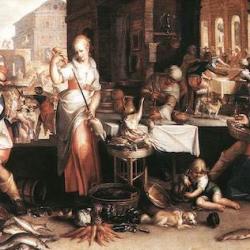In her collection of essays on money, Slave of Two Masters, Melinda Selmys devotes several pages to the celebration of motherhood and its unique economics.
Taking her cue from the curse of Genesis 3, she argues that men have always “lorded” over women by claiming all important human achievements for the male sex. Selmys’s response is withering: “What men chose for themselves is not the better part of human achievement but the more ostentatious part.”
But what men forget, she says, is that a woman’s primary and unique product is men: “The dregs which have traditionally been left to women are the activities which are centered in the dignity of the human person rather than in the grandeur of his accomplishments. The stone of women’s labor, which the builders of Western civilization have rejected, is indeed the cornerstone. This has dire consequences for a society in which not only men but also women have rejected women’s work in favor of economic accomplishment.”
Motherhood has a different economic dynamic than the male-dominated world of labor: “In domestic life, the stronger do not triumph, or even seek to triumph, over the weak. ‘If there is only a crust of bread in the house, and mother and children are starving, their interests are not the same. If the mother eats it, the children want it; if the children eat it, the mother must go hungry to her work. Yet it does not necessarily follow that there will be ‘antagonism’ between them, that they will fight for the crust, and that the mother, being strongest, will get it, and eat it’ (John Ruskin).”
Feminism wants to bring feminine values into play in the market, but tries to do it by minimizing or ignoring what women can uniquely bring. Instead, “women have become increasingly enslaved to those same external accomplishments that have always obsessed men. Classical feminists, with all of the best of intentions, often assumed that the quality of a woman’s life could be measured by the acquisition of wealth and that the primary problems facing women are wage inequality and lack of access to higher paying positions. . . . trying to escape from the curse laid on Eve, women have succeeded in exacerbating it. They have entered into the world of toil and sweat. They are now privileged to be paid meager wages and to be taxed for their work. They still work for men, and the men still lord it over them. Their fertility is artificially suppressed, their bodies freely available for sex.”
This results in a deep alienation: Women “have been inducted into the male-dominated worship of that golden idol in the temple of Mammon and have lost the dignity of being the tabernacle of the image and likeness of God.”










